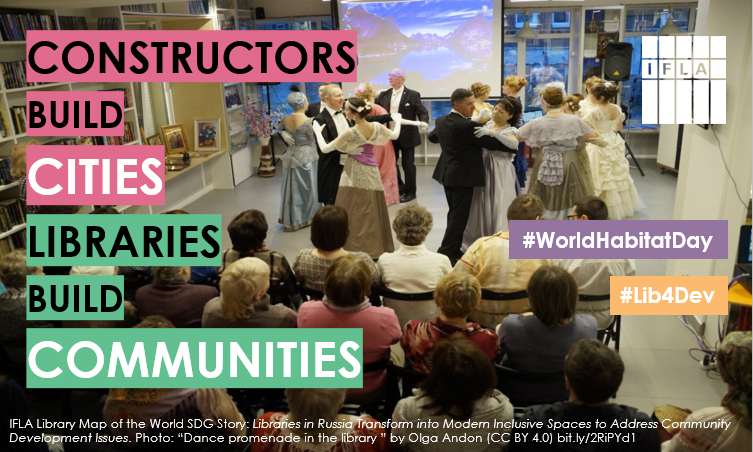
Urbanisation – the growing share of the world’s population living in cities – is a major feature of the world today. From 55% today, over two thirds of all people are expected to live in major built-up areas by 2050.
Yet urbanisation brings its challenges. Congestion, waste management, broken and re-formed social relationships, even loneliness. The United Nations and its members recognised the need to act in 2015 when they created Sustainable Development Goal 11 – Sustainable Cities and Communities, as well as when they agreed the whole New Urban Agenda.
The raises the question – how to make cities liveable. And indeed, how to make sure that cities are communities, with – as the word suggests – something in common between their inhabitants? Libraries can help in at least three ways.
Common Spaces
A first key contribution is in the space that libraries offer. As people live more and more of their lives online, there are fewer obvious reasons to come together in a single space. Yet this does not mean it is less necessary.
Indeed, the possibility to do things together – even go online – remains attractive. A police station, hospital or school does not offer this, nor – at least for people on low incomes – do private venues.
Libraries fill an important gap here, offering a neutral, welcoming space to all members of the community. Indeed, SDG 11.7 underlines this point, setting the following target: ‘by 2030, provide universal access to safe, inclusive and accessible, green and public spaces, in particular for women and children, older persons and persons with disabilities’. Similar language appears in Paragraph 13(c) of the Quito Declaration that launched the New Urban Agenda.
Common Opportunities
A second ingredient of a successful community is a feeling that everyone has their place there. Everyone should be able to access to same services, and have, as far as possible, equal chances of fulfilling their ambitions.
Having access to information – as well as the rights and skills to use it – is a key to this, giving the possibility to learn, find work, and develop both personally and professionally. SDG 11.1 underlines that Member States should, ‘by 2030, ensure access for all to adequate, safe and affordable housing and basic services…’. Again, the Quito Declaration makes the same point.
Once again, libraries help. Internet access on its own can be essential in countries that are less well off. But so too is the support – both formal and informal – provided by dedicated library staff, the access to books subject to copyright, and the fact – as highlighted above – that libraries offer a welcoming space.
Common Heritage
The power of a sense of a shared past is also important, especially at times of rapid change. While this may often be overlooked in favour of interventions with more immediate impact – health, policing, renovations, it is a key part of the mix of actions that help build communities.
Once again, this is an issue recognised by the UN, which, in SDG 11.4, calls on Member States to ‘Strengthen efforts to protect and safeguard the world’s cultural and natural heritage’. IFLA itself has underlined this point in a statement. Paragraph 125 of the Quito Declaration underlines: ‘We will support the leveraging of cultural heritage for sustainable urban development and recognize its role in stimulating participation and responsibility’.
This is not just a question of the ancient past. As highlighted in IFLA’s article for World Peace Day, libraries are also helping people to recognise the events of the more recent past – even traumatic ones – and through activities such as community archiving, are helping to bring people together.
It is not by accident that the SDGs talk about cities and communities. People need both in order to benefit from a sense of wellbeing. Where they are properly supported, libraries make this happen.